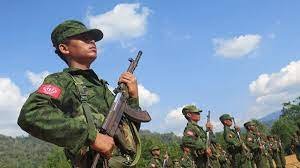In a significant development, the Arakan Army (AA), an armed ethnic minority group in Myanmar, has announced its capture of a town and multiple junta outposts near the borders with Bangladesh and India. This marks another setback for the embattled military, which has been facing persistent challenges since the coup in 2021.
The recent escalation of clashes in Myanmar’s western Rakhine and Chin states began when the Arakan Army attacked security forces in November, effectively ending a ceasefire that had been in place since the junta’s takeover. The conflict has intensified, revealing the deep-rooted tensions between ethnic minority groups and the military, dating back to Myanmar’s independence from Britain in 1948.
The Arakan Army is just one of several armed ethnic minority groups in Myanmar’s border regions, each with its own history of battling the military over issues of autonomy and control of valuable resources. The struggle for self-determination and resource control has created a complex and longstanding challenge for the nation.
About Arakan Army:
The Arakan Army, through posted images, claims to have taken control of Paletwa township, showcasing its fighters outside the town’s police station and general administration office. Paletwa, with a population exceeding 64,000 according to the 2014 census, now finds itself at the center of the conflict, raising concerns about the safety and well-being of its residents.
The situation underscores the volatile nature of Myanmar’s ethnic landscape and the difficulties in achieving a lasting resolution to the ongoing conflicts. The military’s grip on power, coupled with the demands for autonomy from various ethnic groups, continues to fuel tensions, leading to periodic outbreaks of violence.
International observers and human rights advocates are closely monitoring the situation, urging all parties involved to prioritize a peaceful and inclusive dialogue to address the root causes of the conflict. The escalation in Paletwa serves as a stark reminder of the urgent need for a comprehensive and sustainable approach to address the complex ethnic and political dynamics within Myanmar.
As the international community remains watchful, the fate of Paletwa and the ongoing clashes in Myanmar’s border regions will undoubtedly draw attention, highlighting the challenging path towards stability and reconciliation in the troubled nation.






